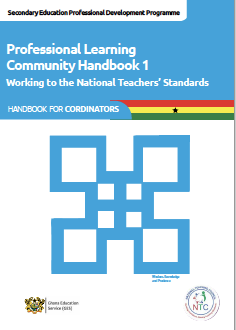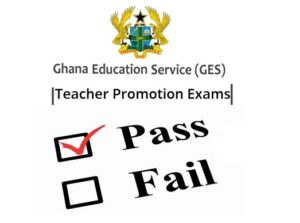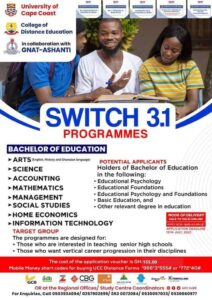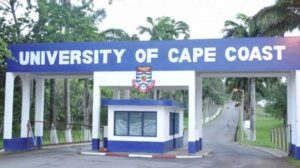Download PLC Handbooks For SHS and Basic School Teachers In Ghana; All About PLC

PLC Handbook
Professional learning communities
Professional learning communities (PLCs) are an approach to school improvement where groups of teachers work collaboratively at the school level to improve student outcomes.
Professional learning community (PLC) schools start from a simple idea: students learn more when their teachers work together. A professional learning community (PLC) is a team of educators who share ideas to enhance their teaching practice and create a learning environment where all students can reach their fullest potential. Most PLCs operate within a school building or across a district. They can be organized by grade level, content area or an entire teaching staff.
Building a PLC is a proven way for schools to increase student learning by creating a culture that is:
- focused on continuous improvement by linking the learning needs of students with the professional learning and practice of teachers
- committed to professionalism
- fueled by collaborative expertise.
Professional Learning Communities (PLCs) are collaborative groups within educational settings where educators come together to enhance their professional skills and improve student learning outcomes. In Ghana, the implementation of PLCs has been gaining traction as a means to foster continuous improvement in teaching methodologies and student achievement.
Understanding Professional Learning Communities (PLCs):
In Ghanaian educational institutions, PLCs typically consist of teachers, administrators, and sometimes other staff members. These communities aim to create a supportive environment where educators can engage in meaningful dialogue, share best practices, and collaboratively work towards common goals to enhance the quality of education.
Key Elements of PLCs:
- Collaborative Learning: PLCs emphasize teamwork, encouraging educators to work together, share experiences, and learn from one another. This collaboration helps in developing effective teaching strategies and addressing challenges collectively.
- Data-Informed Decision Making: Educators in PLCs use data to assess student performance and identify areas that need improvement. This data-driven approach guides instructional planning and interventions to support student learning.
- Reflective Practice: Reflection is a crucial aspect of PLCs. Educators critically analyze their teaching methods, share experiences, and reflect on what works best for their students, fostering continuous improvement.
- Professional Development: PLCs serve as platforms for ongoing professional development. Through workshops, discussions, and shared resources, educators enhance their skills and stay updated with the latest teaching techniques.
Implementation of PLCs in Ghana:
In Ghanaian schools, PLCs are often structured within departments or grade levels. These communities meet regularly, either during designated professional development periods or after school hours, to discuss curriculum, student progress, and instructional strategies.
Challenges and Solutions:
- Resource Constraints: Limited resources, including time and materials, can pose challenges to the effective functioning of PLCs. Schools often tackle this by allocating dedicated time for PLC meetings and accessing external resources through partnerships with NGOs or educational institutions.
- Cultural and Administrative Barriers: Hierarchical structures and cultural norms might hinder open communication within PLCs. To overcome this, schools promote a culture of trust and collaboration, encouraging open dialogue and valuing diverse perspectives.
- Sustainability: Ensuring the longevity and sustainability of PLCs is crucial. Schools address this by integrating PLC practices into their institutional culture, making them an inherent part of the school’s operation.
Impact of PLCs:
The implementation of PLCs in Ghana has shown promising outcomes. It has led to improved teacher collaboration, enhanced instructional practices, better student engagement, and ultimately, increased student achievement across various subjects.
In conclusion, Professional Learning Communities in Ghana serve as dynamic platforms for educators to collaborate, learn, and continuously improve their teaching practices. By fostering a culture of collaboration and professional growth, PLCs contribute significantly to the enhancement of educational standards and student success in Ghanaian schools.
The 10 principles of effective PLCs
Found in all effective PLCs are 10 principles that bring together the best available research on school improvement:
- Student learning focus: School improvement starts with an unwavering focus on student learning.
- Collective responsibility: For every child to achieve, every adult must take responsibility for their learning.
- Instructional leadership: Effective school leaders focus on teaching and learning.
- Collective efficacy: Teachers make better instructional decisions together.
- Adult learning: Teachers learn best with others, on the job.
- Privileged time: Effective schools provide time and forums for teacher conversations about student learning.
- Continuous improvement: Effective teams improve through recurring cycles of diagnosing student learning needs, and planning, implementing and evaluating teaching responses to them.
- Evidence driven: Effective professional learning and practice are evidence-based and data-driven.
- System focus: The most effective school leaders contribute to the success of other schools.
- Integrated regional support: Schools in improving systems are supported by teams of experts who know the communities they work in.
Here are four ways PLCs enhance teaching and learning
Not every educator is sold on the idea of yet another meeting, but when done right, PLCs reap huge benefi
ts for both students and teachers. Here are four ways PLCs enhance teaching and learning:
1. PLCs allow educators opportunities to directly improve teaching and learning.
PLCs allow teachers an easy way to share best practices and brainstorm innovative ways to improve learning and drive student achievement. Good communication is key so that educators can share opinions and feel that what they are doing in the classroom matters.
These learning communities also enhance teacher reflection of instructional practices and student outcomes. Meeting with your PLC gives you the ability to share student progress, and when the data is shared across grade levels within the building, educators and administrators take ownership of every child’s education.
In online learning environments, it’s especially important to create professional learning communities to lighten the load. When collaborating with other educators, discuss ways to share work to lighten the load and ensure you aren’t duplicating work.
2. PLCs build stronger relationships between team members.
The very essence of a PLC is a focus on and a commitment to student learning. Meeting weekly creates a bond and builds a team of leaders within the school or district that eventually extends regionally and globally.
To build a strong team, it’s important to define roles and relationships of team members. This starts from understanding everyone’s strengths within the department and throughout your PLN. Enhancing the strengths of others builds trust and makes relationships come to fruition.
3. PLCs help teachers stay on top of new research and emerging technology tools for the classroom.
Collaboration within a district and beyond is essential in order for educators to have ongoing and regular opportunities to learn from each other. A global PLC allows teachers to share and learn from each other daily. Twitter and other social media sites let teachers collaborate worldwide and create a community of practice that far exceeds their classroom walls.
Within your district or school, you can use a variety of tools to set up communication channels so you can share ideas and best practices or easily join text chats or video calls to collaborate in the moment.
4. PLCs help teachers reflect on ideas.
Learning from others in your PLC allows you to reflect on ways to enhance your teaching and to adjust your practice. The more minds that come together from different backgrounds, the more likely you are to add value and purpose to the field of education.
When PLC’s come together, they must focus their efforts on questions related to learning and create products with the end result of answering questions that lead to student achievement. Student success must be the focus of PLC collaborations.
Download PLC HandBook for SHS
List-of-Approved-Books-for-Use-in-Pre-tertiary-Schools-January-2020-–-February-2021.
[wp-embedder-pack width=”100%” height=”400px” download=”all” download-text=”” attachment_id=”10956″ /]




